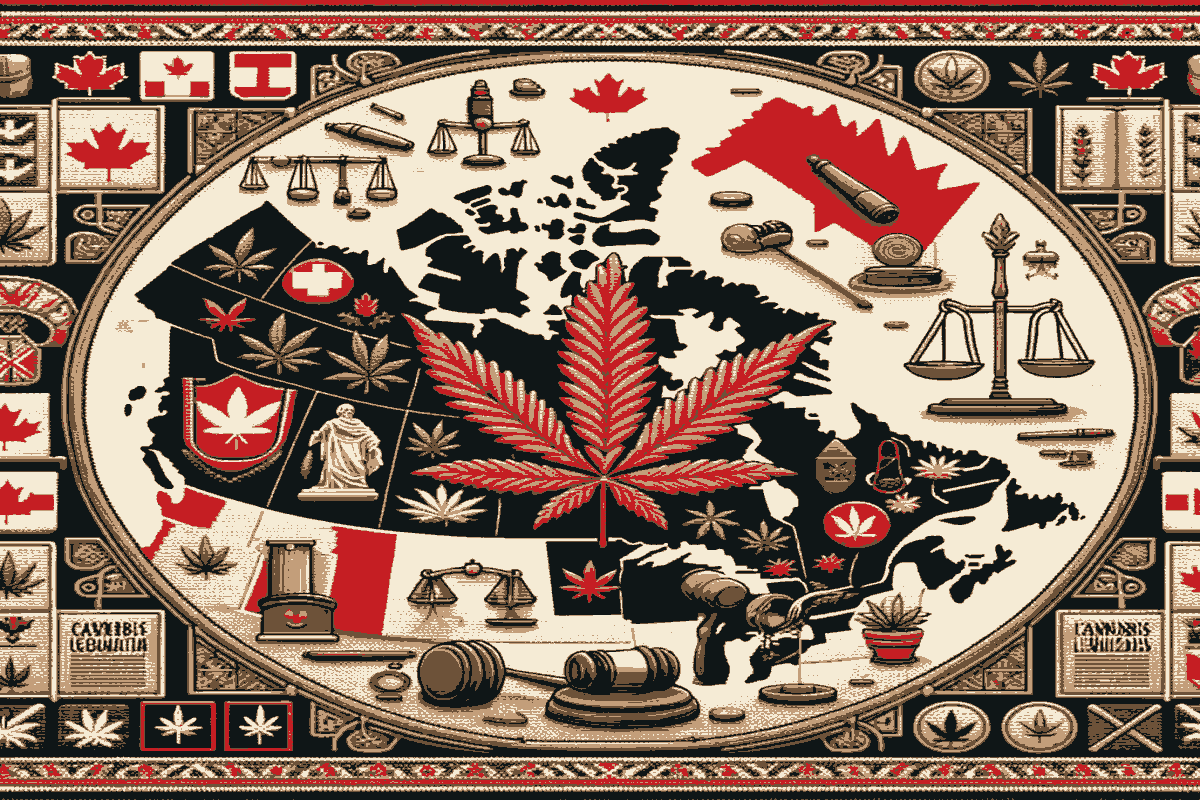Canada’s relationship with cannabis has evolved dramatically in recent years, moving from prohibition to structured legalization. This shift has not only changed the legal landscape but also the cultural fabric of the nation. In this comprehensive guide, we’ll explore the nuances of cannabis legalization in Canada, addressing the questions that matter to consumers, businesses, and policymakers alike.
What Sparked the Move Toward Cannabis Legalization in Canada?
The journey to cannabis legalization in Canada was ignited by a combination of factors, including a shift in public opinion, the desire to reduce the burden on the justice system, and the potential for significant economic benefits. The Cannabis Act, which came into effect on October 17, 2018, marked a historic turning point, establishing a legal framework for controlling the production, distribution, sale, and possession of cannabis across the country. This move towards legalization and regulation was a response to the recognition that the prohibition of cannabis was ineffective and costly.
How Does Legal Cannabis Differ from Illegal Cannabis in Canada?
In Canada, the line between legal and illegal cannabis is drawn firmly in the sand of regulation and compliance. Legal cannabis, which can only be sold by authorized retailers under the strict oversight of Health Canada and corresponding provincial authorities, must adhere to rigorous safety and quality protocols. These standards ensure that legal cannabis products, such as fresh and dried cannabis, cannabis oil, and edible cannabis, are free from contaminants and accurately labeled, safeguarding consumer health. Conversely, illegal cannabis, typically distributed through unregulated channels, bypasses these critical controls, posing risks to consumers and contributing to the shadow economy. The government of Canada has been clear: only cannabis that meets the federal cannabis regulations can enter the legal market, a stance that underscores the importance of consumer safety in the era where cannabis is legal in Canada.
What Are the Federal Cannabis Laws Governing Use and Possession?
The federal framework governing the use and possession of cannabis in Canada is encapsulated in the Cannabis Act. This act permits adults to carry up to 30 grams of legal dried cannabis, or its equivalent, in a public setting. Additionally, the act empowers individuals to grow up to four cannabis plants per household for personal use, provided the seeds are sourced from licensed entities. This provision of the law is not just about facilitating access to cannabis for recreational use; it’s about erecting barriers to underage access and dismantling the illicit market.
The regulation of cannabis extends to the legal sale and possession of cannabis, with the intent to create a controlled environment where the risks of cannabis consumption are mitigated, and the benefits, such as access to cannabis for medical purposes, are preserved. The Cannabis Act represents a comprehensive approach to the legalization and regulation of cannabis, ensuring that while cannabis use in vehicles and public spaces is controlled, the personal freedoms and rights to privacy of Canadian adults are respected.
How Do Provincial Cannabis Regulations Vary Across Canada?
While the Cannabis Act sets the federal framework, each province and territory can tailor certain aspects, such as the legal age for cannabis use, where cannabis can be consumed, and the density and location of retail outlets. For instance, the legal age varies from 18 in Alberta to 19 in most other provinces, reflecting a respect for regional values and priorities. This decentralized approach allows for the regulation of cannabis to be sensitive to the social and cultural norms across Canada.
Can You Travel with Legal Cannabis Within and Outside of Canada?
Traveling with legal cannabis within Canada is permissible within the legal possession limits. However, it remains illegal to transport cannabis across Canadian borders, regardless of the legalization status of the destination country. This applies to all forms of cannabis, including for medical purposes. The status of cannabis as legal in Canada does not extend beyond its borders, and carrying cannabis into other countries can result in serious legal consequences.
What Should You Know About Growing Cannabis at Home Legally?
Navigating the skies and roads with legal cannabis in Canada is permissible, but with clear boundaries. Within the nation’s borders, individuals are allowed to travel with up to 30 grams of legal dried cannabis or its equivalent. However, as soon as one approaches international gateways, the rules change drastically. Despite cannabis’s legal status in Canada, it remains illegal to cross international borders with it, whether for recreational or medical purposes. This stringent regulation persists irrespective of the legalization policies of the destination. The government of Canada has been explicit: the legalization of cannabis within its jurisdiction does not grant a free pass for international travel with the substance, and attempting to do so could lead to severe legal repercussions, including arrest or prosecution.
How Are Cannabis Laws Enforced and What Are the Penalties for Violation?
The enforcement of cannabis laws in Canada is a collaborative endeavor involving federal, provincial, and municipal law enforcement agencies. The penalties for contravening the Cannabis Act are tiered, reflecting the gravity of the offense. For instance, unauthorized sale, exceeding possession limits, and distribution to minors are met with stringent penalties, potentially including fines and incarceration. This robust enforcement regime underscores Canada’s commitment to a regulated cannabis market where public safety is paramount, and the rule of law is upheld.
What Are the Rules for Medical vs. Recreational Cannabis?
In Canada, the currents of medical and recreational cannabis flow in distinct but parallel streams. Since 2001, medical cannabis has been available to patients, and the Cannabis Act has continued to uphold this provision. Patients must source their medicinal cannabis from licensed producers and carry appropriate documentation to substantiate their medical requirements. This bifurcation of cannabis regulation ensures that while patients retain uninterrupted access to cannabis for medical purposes, recreational use is governed by a separate set of rules designed to regulate consumption and maintain public health standards. The Cannabis Act delineates these two uses to prevent any overlap that could compromise the integrity of medical cannabis programs or the control measures placed on recreational use.
How Is Cannabis Away from Public Eyes Regulated in Workplaces and Rental Spaces?
In the private realms of workplaces and rental units, the regulation of cannabis is a delicate dance of discretion and policy. Employers, much like captains of their ships, set the course for cannabis consumption and impairment at work, often drawing parallels with alcohol policies to maintain a safe and productive environment. Landlords, on the other hand, hold the reins on whether to allow the consumption and cultivation of cannabis within the confines of their properties. These rules, however, are not without their boundaries; they must navigate within the legal frameworks established by local laws. The overarching aim is to strike a harmonious balance between individual liberties and the collective well-being, ensuring that the consumption of cannabis remains a private affair, without encroaching on the comfort and safety of others.
What Are the Implications of Cannabis Legalization for Law Enforcement?
The advent of cannabis legalization has ushered in a new era for law enforcement, transforming their role from one of strict enforcement to a more nuanced approach that includes regulation and education. The men and women in uniform now find themselves as guardians of the new legal thresholds, ensuring public safety by upholding possession limits, deterring impaired driving, and dismantling unauthorized cannabis operations. This shift has necessitated a recalibration of law enforcement strategies, equipping officers with the knowledge and tools to navigate the legalization landscape, where the focus is as much on maintaining order as it is on fostering an informed public.
Looking Forward: What’s Next for Cannabis Legalization and Regulation in Canada?
Peering into the future of cannabis legalization and regulation in Canada is like gazing into a kaleidoscope of potential policy adjustments and societal shifts. The legal framework is expected to evolve, potentially expanding or refining regulations around the burgeoning markets of edibles, cannabis extracts, and topicals, as well as the public consumption of cannabis. The government’s watchful eye on public health metrics, youth access, and the persistence of the black market will guide these changes. As the cannabis market in Canada flourishes, it is anticipated that the laws and regulations will adapt in tandem, ensuring that the industry’s growth is matched by responsible governance and an adherence to the principles of public safety and health.
Conclusion
In conclusion, understanding Canada’s cannabis rules is crucial for responsible consumption and participation in the market. From the federal Cannabis Act to provincial nuances, the framework is designed to balance the benefits of legalization with the need for control and safety. As we chart the course of this dynamic landscape, it’s imperative to remain knowledgeable and adhere to regulations, securing the responsible and sustainable growth of Canada’s cannabis sector. Canada’s legalization and oversight of cannabis set a precedent for nations contemplating analogous changes, underscoring the significance of a deliberate and educated strategy in this intricate matter. For those looking to participate in the market, the option to buy marijuana seeds online presents a convenient and accessible way to engage with this burgeoning industry.





